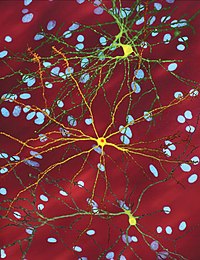
Photo from wikipedia
BackgroundSpinocerebellar ataxias (SCAs) are a group of autosomal dominantly inherited degenerative diseases. As the pathological process probably commences years before the first appearance of clinical symptoms, preclinical carriers of a… Click to show full abstract
BackgroundSpinocerebellar ataxias (SCAs) are a group of autosomal dominantly inherited degenerative diseases. As the pathological process probably commences years before the first appearance of clinical symptoms, preclinical carriers of a SCA mutation offer the opportunity to study the earliest stages of cerebellar dysfunction and degeneration. Eyeblink classical conditioning (EBCC) is a motor learning paradigm, crucially dependent on the integrity of the olivocerebellar circuit, and has been shown to be able to detect subtle alterations of cerebellar function, which might already be present in preclinical carriers.MethodsIn order to acquire conditioned responses, we performed EBCC, delay paradigm, in 18 preclinical carriers of a SCA3 mutation and 16 healthy, age-matched controls by presenting repeated pairings of an auditory tone with a supraorbital nerve stimulus with a delay interval of 400 ms.ResultsPreclinical carriers acquired significantly less conditioned eyeblink responses than controls and learning rates were significantly reduced. This motor learning defect was, however, not associated with the predicted time to onset.ConclusionsEBCC is impaired in preclinical carriers of a SCA3 mutation, as a result of impaired motor learning capacities of the cerebellum and is thus suggestive of cerebellar dysfunction. EBCC can be used to detect but probably not monitor preclinical cerebellar dysfunction in genetic ataxias, such as SCA3.
Journal Title: Experimental Brain Research
Year Published: 2018
Link to full text (if available)
Share on Social Media: Sign Up to like & get
recommendations!